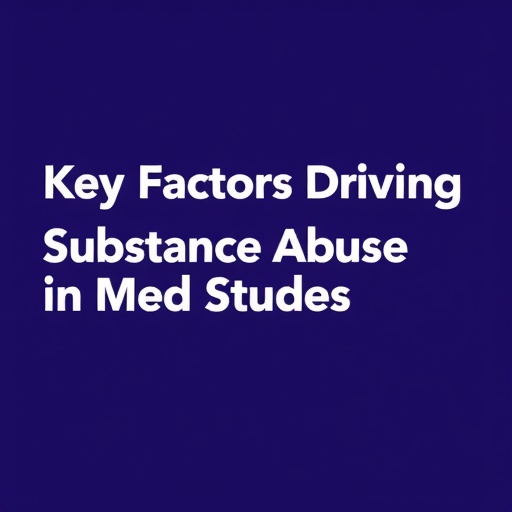A groundbreaking qualitative study conducted at Saint Paul’s Hospital Millennium Medical College in Addis Ababa, Ethiopia, offers vital insights into the multifaceted factors driving substance abuse among undergraduate medical students. Published in the 2025 volume of BMC Psychiatry, this research addresses a glaring knowledge gap in the understanding of substance use within medical training environments, particularly in low- and middle-income countries where such investigations remain scarce. The implications of this study extend beyond regional concerns, shedding light on the broader psychosocial and environmental challenges facing medical learners globally.
The study, which took place from March to May 2023, employed an exploratory qualitative approach involving in-depth interviews with seven medical students identified through snowball sampling who were actively abusing substances. This methodological choice allowed researchers to delve deeply into the lived experiences, motivations, and struggles of these students, providing a rich contextual understanding rather than mere statistical prevalence. The use of thematic analysis facilitated the extraction of coherent patterns and themes from the narratives, offering a nuanced depiction of the underlying drivers behind substance use.
One of the critical revelations of the study is the identification of khat, alcohol, and cigarettes as the substances most prevalently abused among medical students at this Ethiopian institution. Khat, a plant whose leaves are chewed for stimulant effects, is culturally prevalent in the region but has significant implications for health and performance. The prominence of these substances underscores the intersection of cultural norms and accessibility, which complicates efforts toward effective intervention in academic settings.
The research highlights a complex interplay of psychosocial and economic factors underpinning substance abuse. Many students reported coping with considerable academic pressure, social isolation, and financial constraints, which collectively create an environment ripe for resorting to substance use as a form of self-medication or escapism. The psychological burden faced by medical students—commonly cited worldwide—takes on an additional dimension in this context due to limited institutional support and socio-economic challenges endemic to the region.
Another pivotal theme unveiled relates to the medical school environment itself as an influential catalyst for substance abuse behaviors. The demanding curriculum, exposure to clinical stressors, and sometimes permissive peer culture appear to normalize or even encourage substance use. This institutional milieu not only perpetuates substance use but also complicates cessation efforts, as students grapple with balancing their professional aspirations and personal wellbeing.
The study’s exploration of cessation challenges reveals significant barriers to quitting, including stigma, lack of targeted support services, and the physiological and psychological dependence induced by the substances. This finding calls into question the sufficiency of existing health and counseling infrastructures within medical colleges to adequately address substance abuse and highlights an urgent need for tailored intervention strategies.
Strikingly, the researchers emphasize that substance abuse among medical students cannot be viewed through a singular lens; rather, it is a product of intersecting economic hardship, psychosocial stress, and the pressures unique to medical education. This multidimensional understanding underscores the necessity for multifaceted responses, combining policy reform, institutional support, and culturally informed prevention programs.
In light of their findings, the authors advocate for robust college-level interventions including strengthening support groups and enriching campus activities that foster healthy coping mechanisms and social connectedness. Such interventions are proposed to mitigate the isolation and stress that often precipitate substance abuse. Additionally, structural changes such as enforced government regulations on substance availability emerge as critical components for a holistic approach.
The implications of this research resonate beyond the borders of Ethiopia, reflecting global challenges in medical education systems where students grapple with intense workloads, psychosocial stress, and mental health concerns. As medical institutions worldwide endeavor to cultivate future healthcare providers, understanding and addressing factors linked to substance abuse remain pivotal in safeguarding student wellbeing and professional integrity.
Moreover, the study innovatively contributes to the field by utilizing a qualitative richness often absent from epidemiological surveys. This approach yields textured narratives that bring to life the human dimensions of substance abuse, fostering empathy and deeper comprehension that can inform more effective, context-sensitive policy and programming.
By unmasking not only the prevalence but also the driving forces of substance abuse within an academic medical context, the study calls stakeholders to action. Its recommendations implore educational leaders, healthcare policymakers, and community organizations to collaborate in designing comprehensive frameworks that promote resilience, reduce risk factors, and enhance student support.
The research further underscores the importance of culturally sensitive approaches to substance control since substances like khat have complex social and traditional dimensions. Effective policies must balance respect for cultural practices with the imperative to protect student health and academic success, a nuanced challenge many nations face.
In conclusion, this pioneering investigation charts a course for future research and intervention in substance abuse among medical students, spotlighting the urgent need to integrate psychosocial support, economic assistance, and institutional reforms to curb this rising concern. Its findings pave the way for transforming medical education environments into spaces that nurture both academic excellence and holistic health.
Subject of Research: Factors influencing substance abuse among undergraduate medical students at Saint Paul’s Hospital Millennium Medical College, Addis Ababa, Ethiopia
Article Title: Investigating key factors influencing substance abuse among undergraduate medical students at Saint Paul’s hospital millennium medical college, Addis Ababa, Ethiopia: a qualitative approach
Article References:
Sisay, E., Mihret, G. Investigating key factors influencing substance abuse among undergraduate medical students at Saint Paul’s hospital millennium medical college, Addis Ababa, Ethiopia: a qualitative approach. BMC Psychiatry 25, 756 (2025). https://doi.org/10.1186/s12888-025-07053-2
Image Credits: AI Generated




